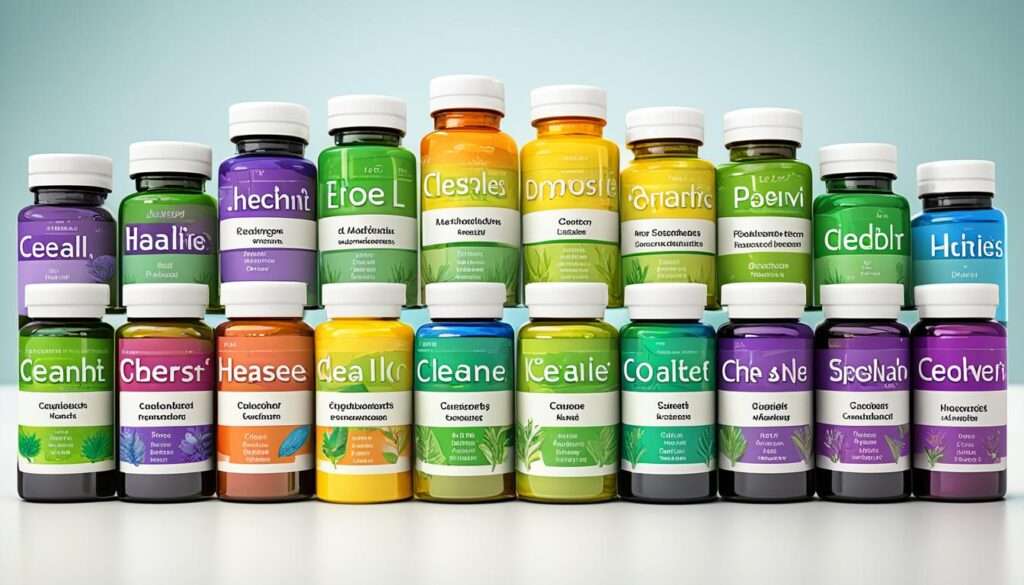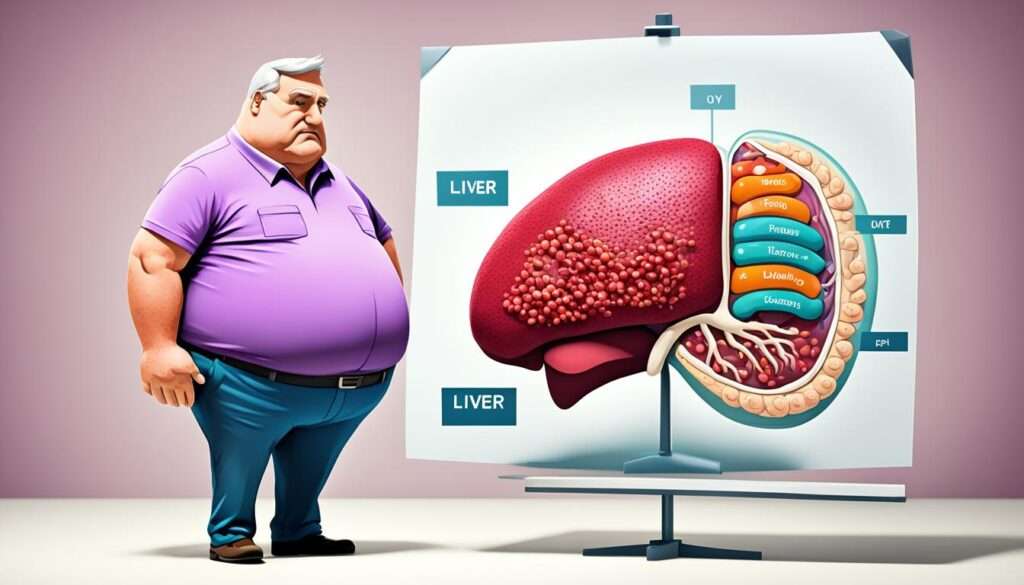Your liver is the key to keeping your body clean. It turns toxins into waste, cleans your blood, and helps your body use nutrients and medicines. Keeping your liver healthy is key to feeling good overall. We’ll look at the best ways to cleanse your liver, strategies, and supplements to help it work well and prevent diseases.
Table of Contents
ToggleThe liver is an amazing organ that does a lot for you. It cleans toxins, makes bile, and helps your body use nutrients and medicines. It’s important to keep your liver healthy for a balanced life. By using the right liver cleanse methods and supplements, you can help your liver work better and lower the risk of liver problems.
Debunking Myths About Liver Cleanses
Liver cleanse myths and misconceptions are common, but it’s key to know what’s true for your health. Many products claim they’re vital for daily health and help with weight loss. But, the truth is quite different.
Myth #1: Liver Cleanses Are Important for Daily Maintenance
Johns Hopkins expert Tinsay Woreta says liver cleanses aren’t checked by the FDA and don’t have enough proof for everyday use. Some ingredients like milk thistle and turmeric might help, but there’s no solid evidence they clear out damage from too much food or alcohol.
Myth #2: Liver Cleanses Aid in Weight Loss
There’s no science to support that liver cleanses help with weight loss. In fact, some supplements in these cleanses could hurt your liver, causing more issues than benefits.
Myth #3: You Cannot Protect Yourself Against Liver Disease
It’s a myth that liver disease is unavoidable. You can take steps to protect your liver. This includes drinking less alcohol, staying at a healthy weight, and avoiding risky behaviors.
Be cautious with liver cleanses and choose methods backed by science to help your liver and overall health.
5 Ways to Support Your Liver Health
Keeping your liver healthy is key for your overall health. It filters toxins, makes essential proteins, and helps with metabolism. You can make simple changes in your life and diet to help your liver health tips and boost its work.
Drinking more water is a simple way to help your liver. It helps remove toxins and supports detox processes.
Exercising regularly is another good idea. It makes you sweat, which helps get rid of bad stuff from your body. This is a natural way to cleanse your liver.
- Avoid foods like processed, sugary, and fatty foods. They can harm your liver and cause damage.
- Add raw vegetable juices to your meals. They’re full of antioxidants and nutrients good for your liver.
- Eat foods high in potassium, like bananas, avocados, and sweet potatoes. Potassium is important for your liver’s health.
By following these easy steps, you can support your liver’s important tasks. This keeps your liver healthy and working well for a long time.

Signs of an Overworked Liver
Your liver is key to filtering toxins, processing nutrients, and managing many body functions. If it gets overworked or damaged, you might notice some not-so-pleasant symptoms. It’s important to know these signs to keep your liver healthy and you feeling good.
One sign of a stressed liver is constipation. This happens when your liver isn’t working right, making digestion tough. You might also see high blood pressure because the liver helps control it.
Dark urine can also show liver stress. It means your liver can’t get rid of waste well. Bloating and acid reflux are other signs, since the liver helps make bile for digestion.
Having trouble losing weight, even with healthy changes, might mean your liver isn’t working right. The liver helps manage metabolism, and problems here can affect weight.
Symptoms like chronic fatigue, poor appetite, moodiness, anxiety, and depression could mean your liver is stressed. Easy bruising, rosacea, and excessive sweating might also hint at liver issues.
Knowing these signs of liver damage is key. Taking steps like drinking Juices To Detoxify The Liver can help your liver work better and keep you healthy.
How to Cleanse Your Liver Naturally
Keeping your liver healthy is key to feeling good overall. There are many natural ways to help your liver detox and work better. Drinking more water and eating foods good for your liver are great steps. These actions can help you naturally cleanse your liver and live a balanced life.
Increase Your Water Intake
Drinking lots of filtered water is easy and effective for your liver. Try to drink at least 8 glasses a day. You can add a bit of salt or turmeric to your water for extra liver benefits. But, avoid carbonated and bottled water with additives that can harm your liver.
Induce Sweating Through Exercise
Working out and sweating can help your liver get rid of toxins through your skin. Try yoga, running, or sauna sessions for a liver cleanse. Doing at least 30 minutes of exercise most days helps your liver detox.
Eliminate Toxic Foods
Stay away from processed, high-fat, and sugary foods that can hurt your liver. Eat a diet full of whole, natural foods instead. Include lots of fruits, veggies, lean proteins, and healthy fats to help your liver work well.
Drink Raw Vegetable Juices
Raw vegetable juices are packed with nutrients and antioxidants good for your liver. Juices from leafy greens, carrots, beets, and other veggies can help clean out toxins. This makes your liver work better.

The Importance of Potassium-Rich Foods
Keeping a diet rich in potassium is key for your liver’s health and function. Potassium helps clean the liver, lowers blood pressure and cholesterol, and keeps your heart healthy.
Adding foods high in potassium to your meals is vital for liver health. These foods are packed with vitamins, minerals, and antioxidants that help your liver too.
Here are some top foods to eat for more potassium and liver support:
- Sweet potatoes
- Tomato sauces
- Beet greens
- Spinach
- Beans
- Bananas
Eating these foods often can boost your liver’s detox work and keep it running well. A diet full of potassium is key for a healthy liver and overall wellness.
Best Liver Cleanse: Herbal Supplements and Medications
Lifestyle and diet are key to a natural liver cleanse. But, liver cleanse supplements and medications can also help. Ingredients like milk thistle and turmeric support liver health. Sometimes, you might need prescription treatments for liver damage or disease.
Supplements like Lebercure, Liver Support Plus, and Liver Guard Plus boost liver health and detox. They also help with digestion. These supplements have ingredients such as:
- Milk thistle: Supports liver cell regeneration and protects against toxin-induced liver damage.
- Turmeric: Possesses anti-inflammatory and antioxidant properties that can benefit liver function.
- Artichoke leaf: Helps stimulate bile production and improve digestion.
- Dandelion root: Believed to have diuretic and liver-protective effects.
For serious liver diseases like hepatitis or alcoholic liver disease, you might need prescription drugs. These can help manage the condition and prevent more damage. Always talk to a healthcare professional about these treatments.

Herbal supplements can be great for liver health, but always check with a healthcare provider first. This is especially true if you have liver conditions or take other medications.
Treating Existing Liver Damage
If you have liver damage or disease, there are many treatment options. It’s important to manage it well to keep your liver healthy and stop further damage.
Hepatitis A and B
Vaccines can prevent hepatitis A and B. They are strongly advised for those at risk. For those with chronic hepatitis B, there are effective oral medicines. These help manage the condition and stop long-term liver damage.
Alcoholic Liver Disease
Stopping alcohol use is key for those with alcoholic liver disease. This helps the liver heal and lowers the chance of more damage. It also stops the disease from getting worse.
Hepatitis C
New treatments have changed how we handle hepatitis C. Now, there are powerful oral medicines. These can cure the infection and stop serious problems like cirrhosis and liver cancer.
Nonalcoholic Fatty Liver Disease
Weight loss is the best treatment for nonalcoholic fatty liver disease. Losing weight reduces liver fat. This improves liver function and stops the disease from getting worse, like turning into nonalcoholic steatohepatitis (NASH).
The Role of Obesity in Liver Disease
Being overweight is a big risk for liver health. Having too much fat, especially around the belly, can cause nonalcoholic fatty liver disease (NAFLD). This happens when fat builds up in the liver, leading to inflammation, scarring, and cirrhosis, a serious liver damage.
In the U.S., more people are getting overweight, and this is making NAFLD more common. Experts say NAFLD might soon be the top reason for liver transplants here. This shows how important it is to fight obesity and its effects on the liver.
People who are heavy or obese face a higher chance of getting fatty liver disease. This extra fat in the liver starts inflammation, cell damage, and scar tissue. Over time, this can turn into cirrhosis or even liver failure.

To lower the risk of liver disease, keeping a healthy weight is key. This means eating well and exercising regularly. By doing this, people can cut down their risk of NAFLD and other liver problems. Also, seeing a doctor regularly can help spot and manage liver issues early.
In short, obesity’s impact on liver disease is a big concern. Knowing how being overweight can lead to fatty liver disease helps people take steps to protect their liver. This can prevent serious liver problems.
Lifestyle Changes for Liver Health
Keeping a liver-friendly lifestyle is key to avoiding liver disease and keeping you healthy. Simple changes to your daily life can help protect your liver and lower your risk of liver problems.
One key step is to drink less alcohol. Too much alcohol can harm your liver, leading to serious conditions. Try to drink less or avoid alcohol if you can.
Eating right is also vital. Include lots of fruits, veggies, and whole grains in your meals. These foods are good for your liver and help prevent liver disease.
Regular exercise is another must for a healthy liver. Being active keeps you at a healthy weight, lowers inflammation, and boosts blood flow to your liver. All these help your liver stay healthy.
Stay away from risky behaviors that can hurt your liver. This means avoiding harmful substances and certain medicines. By doing these things, you help prevent liver disease and keep your liver healthy for the long run.
Looking after your liver is all about making healthy choices every day. By adding these habits to your routine, you can protect your liver and live a healthier life.
Conclusion
Your liver is a key part of your health, playing a big role in keeping you well. Liver cleanse products might seem like a good idea, but they’re not needed for everyday liver health. They also don’t fix existing liver damage.
Instead, focus on making lasting changes in your life and diet. Use natural ways to support your liver and talk to your doctor about any liver health issues.
Being active in your liver health helps you stay well and prevents liver diseases. Drink plenty of water, exercise regularly, and avoid harmful foods. Eat foods good for your liver, like those high in potassium. Also, think about taking herbal supplements or medicines with your doctor’s advice if you have liver damage.
Your liver can bounce back, but it needs your support to work right. By following what we’ve talked about, you can keep your liver healthy. This lowers your risk of liver disease and helps you feel better overall.
FAQ
What is the primary function of the liver?
The liver filters toxins and cleanses your blood. It also breaks down nutrients and medicines. Keeping your liver healthy is key for your overall health.
Are liver cleanse products essential for daily liver health?
No, liver cleanse products are not proven to be necessary for daily liver health. They claim to help with weight loss but lack scientific support. The FDA doesn’t regulate them, and there’s no solid evidence for their use.
Can liver cleanses help rid the body of damage from excess consumption of food or alcohol?
No, liver cleanses don’t remove damage from too much food or alcohol. Some supplements can even harm your liver.
What are the proven preventive steps to protect against liver disease?
To prevent liver disease, limit alcohol, stay at a healthy weight, and avoid risky behaviors.
What are the symptoms of an overworked or damaged liver?
Signs include constipation, high blood pressure, dark urine, bloating, acid reflux, and trouble losing weight. Other symptoms are chronic fatigue, easy bruising, poor appetite, mood swings, anxiety, depression, rosacea, and excessive sweating.
What are effective natural ways to support your liver’s detoxification processes?
Good ways to support your liver include drinking lots of filtered water, exercising to sweat, eating fewer processed foods, and using raw vegetable juices.
Why is maintaining adequate potassium levels important for liver health?
Potassium is key for liver health. It helps clean the liver, lowers blood pressure and cholesterol, and supports heart health.
What are some herbal supplements and medications that can aid in the liver detoxification process?
Supplements like milk thistle and turmeric may help liver function. Sometimes, prescription drugs are needed for liver damage or disease.
What are the treatment options for individuals with existing liver damage or disease?
Treatments include vaccines for hepatitis A and B, oral meds for chronic hepatitis B and C, and losing weight for nonalcoholic fatty liver disease.
How does obesity impact the risk of developing nonalcoholic fatty liver disease?
Obesity raises the risk of nonalcoholic fatty liver disease. Too much fat in the liver can cause inflammation and harm. Obesity is making this liver disease more common, possibly leading to more liver transplants in the future.
Source Links


